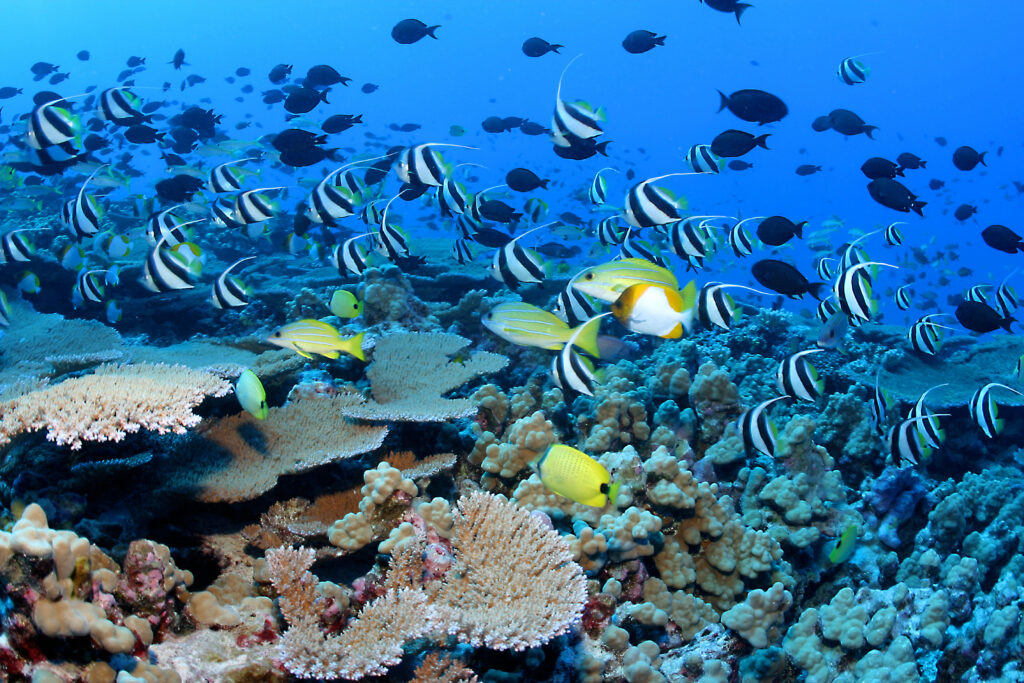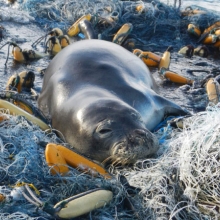By Brooke Paligo
By 2050, there will be more plastic than fish in the ocean according to a 2016 report by the Ellen MacArthur Foundation. This statistic becomes even more alarming when we consider that up to eighty percent of all life on Earth lives in the ocean (MarineBio Conservation Society). Moreover, a vast magnitude of life depends on the health of our oceans. As stewards of the Earth, we confront the daunting challenge of aiding both our fellow people and the environment as we work to mitigate the ever-growing problem of pollution. The constant influx of plastic waste threatens marine life everyday, and addressing this crisis can seem overwhelming.

When I was looking up a playlist on YouTube, I got an ad for a website browser called Ocean Hero. The ad told me that each time I submitted a search using this browser, I would be contributing to helping eliminate ocean-bound plastic waste. I’ve always looked for little ways to help the environment, and I knew this was one of my answers. I immediately clicked on the link to add Ocean Hero to Chrome and have been helping to collect plastic waste from my desk ever since. Ocean Hero is more than just a search engine; it is a way to turn our constant online searches into the collection of ocean-bound plastic.
The innovation behind Ocean Hero lies in its unique business model, which redirects advertisement revenues–a common income stream for search engines–toward marine conservation. For every five searches made on Ocean Hero, one plastic bottle is recovered from polluting our oceans. This may seem like a meager number, but on Google, there are an average of 40,000 search queries every second or 3.5 billion searches daily. If all of these searches were on Ocean Hero, 700 million ocean-bound plastic bottles could be collected every day. By using Ocean Hero instead of a regular search engine, we can each contribute to a larger effort to protect our oceans from further pollution.
At the time of writing this, the searches from Ocean Hero users have funded the collection of an astonishing 77,015,658 bottles–which increases every second. This impressive figure illustrates not only the tangible impact of choosing Ocean Hero but also shows hope for the health of our marine environment. We can prevent a world where the amount of ocean plastic outweighs the 20,000 species of fish in the ocean. Each bottle recovered is one less threat to the delicate marine ecosystems. Opting for Ocean Hero is an effortless, yet profoundly impactful act of stewardship that enables each of us to contribute to the preservation of our planet’s oceans.

As followers of Christ, we were given the blessing of the Earth and the responsibility to care for it. In the Doctrine and Covenants, the Lord explains that he made every person “accountable as a steward over earthly blessings” that He “made and prepared for my creatures” (Doctrine and Covenants 104:13). Not only did Christ craft the universe for us, He created it for all the animals, plants, and bacteria that inhabit the Earth. Furthermore, we have a role to conserve and protect all His living creations. We are also reminded that “all things” are the Lord’s (Doctrine and Covenants 104:15). All the marine life, from the small Angel Fish to the giant Blue Whales, are His and a gift given from Him. We should all work to take care of His gift to us, and one way we can do this is to use Ocean Hero to fund efforts towards marine conservation.
All in all, the challenge of ocean pollution is immense but not insurmountable. As earthly stewards, we can work towards our goal of environmental conservation by integrating Ocean Hero into our daily life.
Each search, each bottle collected brings us closer to oceans that are no longer threatened by plastic pollution and that are thriving ecosystems full of life. Even the smallest of our actions can make a difference–including adding Ocean Hero to your browser.
Do you want to start using Ocean Hero? The browser is available for free as a Chrome extension at the Chrome Web Store or as an app on Android and Apple devices.
Sources:
Einhorn, Catrin. “These Items in Your Home Are Harming America’s Sea Animals.” The New York Times, 19 Nov. 2020, www.nytimes.com/2020/11/19/climate/plastic-ocean-animals.html.
“Environmental Stewardship and Conservation.” Www.churchofjesuschrist.org, www.churchofjesuschrist.org/study/manual/gospel-topics/environmental-stewardship-and-conservation?lang=eng.
Fisheries, NOAA. “Fun Facts about Fascinating Fish | NOAA Fisheries.” NOAA, 3 May 2022, www.fisheries.noaa.gov/national/outreach-and-education/fun-facts-about-fascinating-fish#:~:text=The%20most%20often%20quoted%20estimate.
“How OceanHero Works.” Oceanhero.today, oceanhero.today/about-us/how-it-works.
Tiu, Eugenie. “22 Search Engine Statistics, Facts & Trends for 2022.” Cloudwards, 7 Feb. 2022, www.cloudwards.net/search-engine-statistics/.
Wearden, Graeme. “More Plastic than Fish in the Sea by 2050, Says Ellen MacArthur.” The Guardian, The Guardian, 14 Feb. 2018, www.theguardian.com/business/2016/jan/19/more-plastic-than-fish-in-the-sea-by-2050-warns-ellen-macarthur.
Brooke Paligo was born in Tennessee and lived there for 16 years until moving to Utah. She is currently a high school student aiming for a Ph.D in environment science. Brooke believes that before we go to another planet we should save this one.
Note: Blog posts are written by volunteer writers; the opinions of writers are their own and are not necessarily representative of Latter-day Saint Earth Stewardship.
